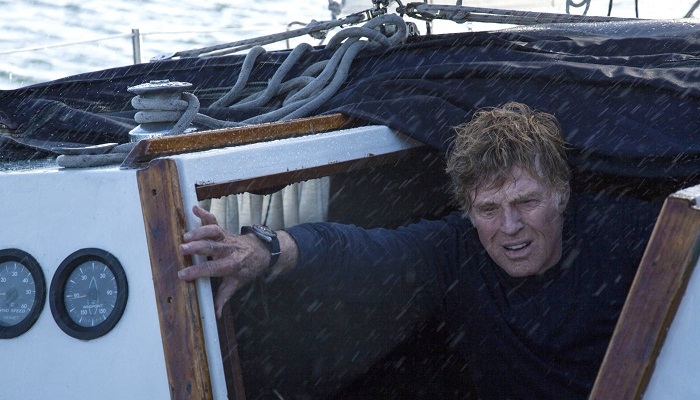J.C. Chandor made his name with Margin Call, a 2011 ensemble piece about the impending financial collapse. This time out, Chandor has to make do without a large cast of A-list actors, no meaningful amount of dialogue, and no large cityscape.
All he has to work with here is just one man, his boat and the vast Indian Ocean. It’s quite the transition for a director with not much to his name, and a particularly ambitious one with silent movies virtually non-existent since 1927. The film opens with a voiceover by Robert Redford apologizing to a person we will never meet, and shortly thereafter, it gets quiet.
An unnamed man (Robert Redford) wakes up to the distressing image of his yacht on a collision course with a deserted shipping container. Years on the sea have given the man a mariner’s intuition, but even with that knowledge, he barely survives the impact. Age is catching up to him.
The crash leaves his navigation equipment and radio disabled and the yacht stranded in the path of an oncoming storm. Attempts to patch the hull go well, though he is left with nothing more than nautical maps and currents to attempt to place his location. Drawing the attention of another ship will be difficult, and dangers continue to accumulate in the form of sharks, dwindling supplies and the limits of his own knowledge. With each new obstacle, death becomes an inescapable fate. Robert Redford trades in the relative comfort of directing political thrillers for a role that would be physically demanding even for a much younger actor. The 77-year-old performs most of the stunts asked of him–it’s just him up there, self-doubt and all, combating the elements, mostly dialogue-free except for when he punctuates these silence with bursts of profanity.
 All Is Lost will surely be compared to the recently-released Gravity, but there’s a restraint to Redford’s nameless sailor that isn’t present in Cuaron’s film, patching up hole after hole, pumping water out of his damaged vessel with little more than a make-shift broom handle stick. This film is more internal and not always a graceful look at the acceptance of aging and all of the morbid realizations that come with it.
All Is Lost will surely be compared to the recently-released Gravity, but there’s a restraint to Redford’s nameless sailor that isn’t present in Cuaron’s film, patching up hole after hole, pumping water out of his damaged vessel with little more than a make-shift broom handle stick. This film is more internal and not always a graceful look at the acceptance of aging and all of the morbid realizations that come with it.
Choosing Robert Redford as the leading man in this picture instead of, say, Tom Hanks, pushes the audience to a not-so-subtle reminder that death is unavoidable, striking us all down regardless of age. By casting Redford the situation is made more futile. A man his age is hardly adept at fending off calamity after calamity, so just how much more time on this Earth could he possibly have? It’s part of the human condition that we all know what’s coming, but certainly few have the grace and dignity to accept what comes, most fight it tooth and nail. That particularly haunting thought lingers throughout the theatre as each pained expression registers on Redford’s face. He truly is the last great movie star.
A serious, auteur-driven film demands certain things of its audience and All Is Lost could prove to be a tough sit for moviegoers looking for a flick to pass the time rather than an introspective metaphor, but for those willing to meet the film on its terms, All Is Lost proves quite captivating. Chandor never overplays his hand, and in doing so he creates a worthy portrait of a man in a dire situation that resonates with us all.





















2 thoughts on “‘All Is Lost’ Grips Viewers and Refuses to Let Go”
Pingback: Watch All Is Lost (2013) Online Free #PutLocker | PutLocker.Pro - Watch Movies Online Full HD
Would a younger man really have fared better? The film does not make that clear at all. The review makes it sound like this film is about the limitations of age, and about aging – but if the film HAD been made with Tom Hanks or some other, unknown actor, would it have had a completely different impact? Not on me.